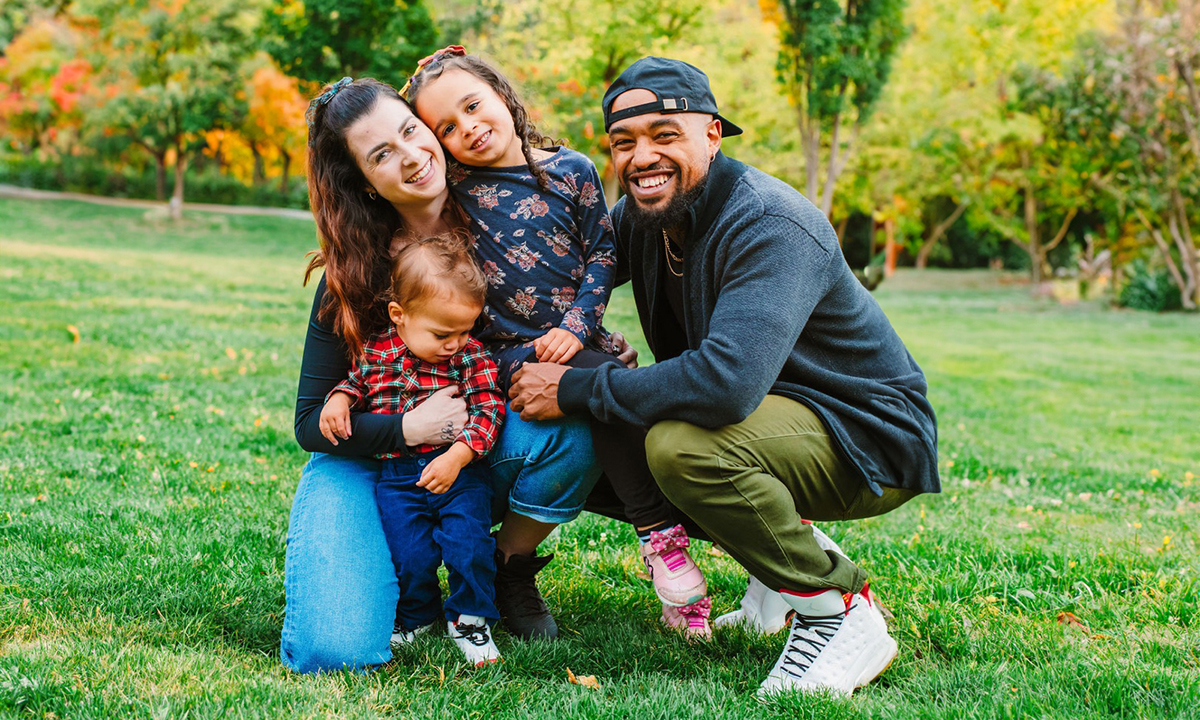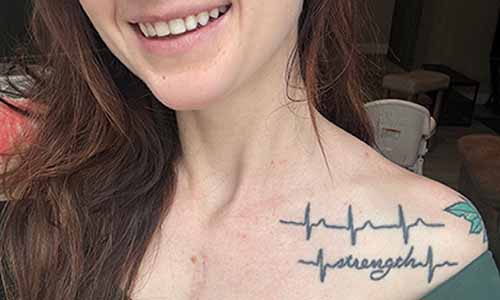
Fallon Williams, left, pictured with her son, Zay, daughter, Eko, and husband, Bashaun.
Heart health, using her own word, is “dear,” to ARUP Laboratories employee Fallon Williams. She has needed cardiac care since infancy, when at a few weeks old, her heart stopped, and her tiny body turned purple. Williams was rushed to the hospital, where doctors found a complete atrioventricular (AV) canal defect and performed immediate open-heart surgery. Over the years, Williams has had two additional open-heart surgeries and nearly a dozen other heart procedures, and she now helps manage cardiac care for her 4-year-old daughter, Eko.
“I was pregnant with my son when she was diagnosed, and it was pretty crushing for me because I knew that the only way to fix it was open-heart surgery,” Williams recalled. Memories of not being able to participate in physical education or fourth-grade soccer came flooding back as the life she had envisioned for her daughter collided with her own childhood physical limitations.
“I remember my doctor telling me, ‘No, we don’t know what would happen if a soccer ball hit you in the chest. You should not risk it,’ and I remember being devastated,” Williams said.
She is sharing her story in hopes that others never feel that devastation. Williams has been selected to be part of the Woman of Impact Campaign Initiative from the American Heart Association. This nine-week competition started on February 7, and it inspires changemakers to educate women on their risks for cardiovascular disease, which is a leading cause of death in women, and to raise funds for research.
“I feel such a calling to this campaign because of my own condition, my daughter’s condition, and I want to be a strong role model for her,” Williams said.
Eko’s pediatrician detected a murmur when she was about 6 months old. She was eventually diagnosed with a partial AV canal defect, affecting the bottom portion of her heart, and had open-heart surgery at 2 1/2 years old.
“I was in the hospital for seven to 10 days for most of my big procedures. Fast-forward 30 years, Eko was only in the hospital for five days, and the surgery took half as much time as mine,” Williams said. “She recovered quickly, but her heart anatomy is unique, and her cardiologists are closely monitoring her.”
Mother and daughter have similar holes in their hearts, but currently there is no defined genetic cause. When Williams decided to risk her own health to have children, doctors assured her that she could not pass on her heart condition. While that is true for her son, whose heart is healthy, her daughter will likely need additional heart procedures.
“Studies show there are families where this is inherited, but nobody has identified a gene yet,” said Hunter Best, PhD, FACMG, ARUP medical director of Molecular Genetics and Genomics. Best and Williams have worked together at ARUP for more than a decade, and both hope whole genome sequencing (WGS) can provide some answers.
“ARUP is in the process of updating our [WGS] test, we are looking at more variant classes, and the odds of us finding a variant that causes the disease in her family may increase,” Best said. He cautioned that WGS may not provide clues at this time, but he also expressed hope for the future.
“Whole genome sequencing analysis is continually improving, and we can always go back and reinterpret [Williams’] results through the lens of the latest scientific findings,” Best said. “What sets ARUP apart is the depth of experience and time we allocate to doing the interpretation and analysis of the data.”
ARUP’s mission includes continually improving laboratory medicine, sharing our findings, and providing excellent patient care, which extends to our employees.
“If we identify a variant in a gene that hasn’t been previously linked to this condition, we could publish that and ultimately help other families,” Best said.
Williams has set a fundraising goal of $150,000 for her Woman of Impact campaign. She plans to reach this goal by using point-of-sale methods, rounding-up donations when people make purchases at her father’s gas stations; selling tickets for a dinner that her brother, a professional chef, will curate; and fundraising through sponsorships of a cycling challenge at Church Cycle, where she teaches.
Williams said she fell in love with moving her body shortly after she started working overnight in Automated Specimen Management at ARUP. She started small with weightlifting at ARUP’s Wellness Center and avoided intense cardio workouts. As her career progressed into the daytime, and she started working in document control for the molecular groups, her fitness progressed, too. Eventually, her now-husband convinced her to try indoor cycling.
“I remember he said, ‘Fallon, this is so fun. I think if you tried it, it could maybe strengthen your heart,’” she recollected. She took a cycling class with him, started going multiple times a week, and her cardiologist noticed the results.
“He said my heart was strong, and my valve leakage problems were stagnant, which is good,” Williams said. She explained that doctors thought she would need three heart valves replaced by the time she turned 30. At 31, she is focused on keeping up her cardiovascular health to “avoid surgeries,” and admits that at the beginning of her fitness journey, she disregarded her doctor’s advice.
“A lot of people think I’m crazy for that, but I eventually got my doctor’s blessing. I was motivated by my desire to have children with my husband and had been told I couldn’t or shouldn’t have kids. I had to find a way to strengthen my heart,” Williams said. Both her pregnancies were considered high-risk and involved additional monitoring and tests for her and her babies. Unfortunately, a fetal echocardiogram did not help diagnose Eko. Otherwise, she would have received treatment much earlier.

“After I had my son, we kept him in the hospital and did more extensive testing to make sure he didn’t have the AV defect,” Williams explained. She understands the heartache and fear families feel when faced with medical conditions that have unknown causes.
“To find a missing link that could possibly provide clarity for parents who are scared to have babies with this condition would be awesome,” Williams said. “In the time between my surgeries and my daughter’s, we’ve come a long way. I’m doing this so that 20 years from now, maybe this condition is even less of a big deal.”
Williams has a tattoo of her heart rhythm on her chest. Underneath it, the word “strength” is formed in the peaks and valleys of an electrocardiogram (EKG) report.
“It has taken a lot of strength to get to this place, to have my own family, to be so physically active, and to finally be supporting the American Heart Association, which is something so dear to my heart,” said Williams.
Learn more about Williams’ Woman of Impact campaign here.
Bonnie Stray, bonnie.stray@aruplab.com
















